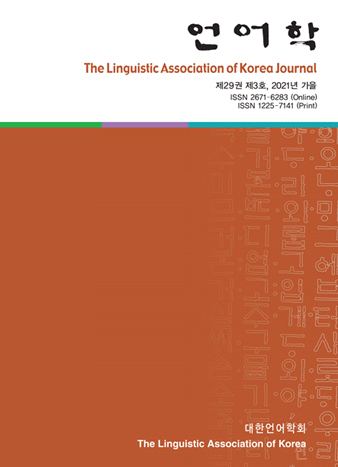대한언어학회 전자저널
29권 3호 (2021년 9월)
- Keyword Analyses of a 19th Century English Expedition Journal Corpus: Focusing on Vancouver and Broughton’s Expedition Journal
-
Sunghwa Lee · Se-Eun Jhang · Qi Yang
Pages : 105-128
Abstract
Lee, Sunghwa; Jhang, Se-Eun & Yang, Qi. (2021). Keyword analyses of a 19th century English expedition journal corpus: Focusing on Vancouver and Broughtons expedition journal. The Linguistic Association of Korea Journal, 29(3), 105-128. The purpose of the study is to investigate the lexical characteristics of Maritime English as used in the 18th and 19th centuries through two approaches to keyword analysis: corpus frequency-based keyword analysis and text dispersion-based keyword analysis. The target corpus used in this study is an English journal corpus consisting of Captain Vancouver and Lieutenant Broughtons expedition journal written in the late 18th and early 19th centuries. We focus on comparing important maritime-related words and essential theme-specific words used in the target corpus with those used in the BE06 corpus, representing contemporary general British English, and those used in the Contemporary Maritime English Corpus (CMEC). Through a bilateral cross-comparison of the two keyword analyses, we conclude that dispersion-based keyword analysis shows better results than frequency-based keyword analysis in that the former is more effective than the latter regarding the two criteria proposed by Egbert and Biber (2019): the content-distinctiveness of maritime-related keywords and the content-generalisability of theme-specific keywords. We also discuss some exciting findings about maritime-related keywords under a multilateral comparison of those used in the target corpus and the BE06 corpus as well as in the target corpus and the CMEC.
Keywords
# keyword analysis # expedition journal # frequency # text dispersion # Maritime English
References
- Allen, D. W. (2002). The British Navy rules: Monitoring and incompatible incentives in the age of fighting sail. Explorations in Economic History, 39(2), 204-231.
- Baker, P. (2004). Querying keywords: Questions of difference, frequency, and sense in keyword analysis. Journal of English Linguistics, 3, 346-359.
- Baker, P. (2009). The BE06 Corpus of British English and recent language change. International Journal of Corpus Linguistics, 14(3), 312-337.
- Baron, A., Rayson, P., & Archer, D. (2009) Word frequency and key word statistics in historical corpus linguistics. International Journal of English Studies, 20(1), 41-67.
- Bertels, A., & Speelmam, D. (2013). ‘Keywords Method’ versus ‘Calcul des Spécificités’. International Journal of Corpus Linguistics, 18(4), 536–560.
- Bondi, M. (2010). Perspectives on keywords and keyness: An introduction. In M. Bondi & M. Scott (Eds.), Keyness in texts (pp. 1-18). Amsterdam: John Benjamins Publishing Company.
- Chung T., & Nation, P. (2004). Identifying technical vocabulary. System, 32, 251-263. Dunning, T. (1993). Accurate methods for the statistics of surpise an coincidence. Computational Linguistics, 19(1), 62-74.
- Egbert, J., & Biber, D. (2019). Incorporating text dispersion into keyword analyses. Corpora, 14(1), 77-104.
- Gabrielatos, C. (2018). Keyness analysis: Nature, metrics and technique. In C. Taylo & A. Marchi (Eds.), Corpus approaches to Discourse: A critical review (pp. 225-258). Oxford: Routedge.
- Gabrielatos, C., & Sarmento, S. (2006). Central modals in an aviation corpus: Frequency and distribution. Letras de Hoje, 41(2), 215-240.
- Gelus, J., & Hirch, R. (2019). The reference corpus matters: Comparing the effect of different reference corpora on keyword analysis. Register Studies, 1(2), 209-242.
- Goh, G.-Y. (2011). Choosing a reference corpus for keyword calculation. Linguistic Research, 28(1), 239-256.
- Grabowsky, L. (2015). Phrase frames in English pharmaceutical discourse: A corpus-driven study of intra-disciplinary register variation. Research in Language, 13(3), 266-291.
- Gries, S. T. (2021). A new approach to (key) keywords analysis: Using frequency, and now also dispersion. Research in Corpus Linguistics, 9(2), 1-33.
- Ha, M. (2020). Exploring academic vocabulary in advertising English corpus. Studies in Linguistics, 57, 223-2453
- Hong, S.-C., & Jhang, S.-E. (2010). The compilation of a Maritime English corpus for ESP learners. Korean Journal of English Language and Linguistics, 10(4), 963-985.
- Hou, H. (2014). Teaching specialized vocabulary by integrating a corpus- Based approach: Implications for ESP course design at the university level. English Language Teaching, 7(5), 26-37.
- Jhang, S., Yu, Y., & Lee, S. (2017). Trends in maritime safety standards through keyword analysis of the SOLAS Convention. Journal of Language Sciences, 24(2), 227-251.
- Lee, S. (2016). Network analysis of Maritime English Corpus with multi-word compounds: Keyword networks and collocation networks. Unpublished doctoral dissertation, Korea Maritime and Ocean University.
- Liu, S. (2021). Trends in maritime environment protection through keyness analysis of the MARPOL convention. Unpublished doctoral dissertation, Korea Maritime and Ocean University.
- Qi, Y. (2019). Syntactic and semantic patterns of domain-specific multiword units in marine accident investigation reports. Unpublished doctoral dissertation, Korea Maritime and Ocean University.
- Scott, M. (1997). PC analysis of key words – and key key words. System, 25(2), 233-245.
- Scott, M. (2016). WordSmith Tools version 7. Stroud: Lexical Analysis Software.
- Scott, M. (2020). WordSmith Tools version 8: Lexical Analysis Software. Retrieved
- April 15, 2020, from https://www.lexically.net/wordsmith/ downloads/
- Scott, M., & Tribble, C. (2006). Textual patterns, key words and corpus analysis in language education. Amsterdam, The Netherlands: John Benjamins.
- Srichai, P. (2017). A corpus-basd study of specialized vocabulary from American political news articles: An analysis of lexical items. Unpublished master’s thesis, Thammasat University.
- Stubbs, M. (2010). Three concepts of keywords. In M. Bondi & M. Scott (Eds.), Keyness in texts (pp. 21-42). Amsterdam: John Benjamins Publishing Company.
- Vancouver, G. (Capt), & Broughton, (Lt). (1802). A narrative or journal of a voyage of discovery to the North Pacific Ocean and round the world performed in the years 1791, 1792, 1793, 1794 and 1795. London: Lee.
- Xu, L. (2021). Developing vocabulary lists in specialized Maritime English corpora. Unpublished doctoral dissertation, Korea Maritime and Ocean University.
- Xu, L., & Jhang, S.-E. (2020). Keyword analyses of English charter parties. Linguistic Research, 37(2), 267-288.
